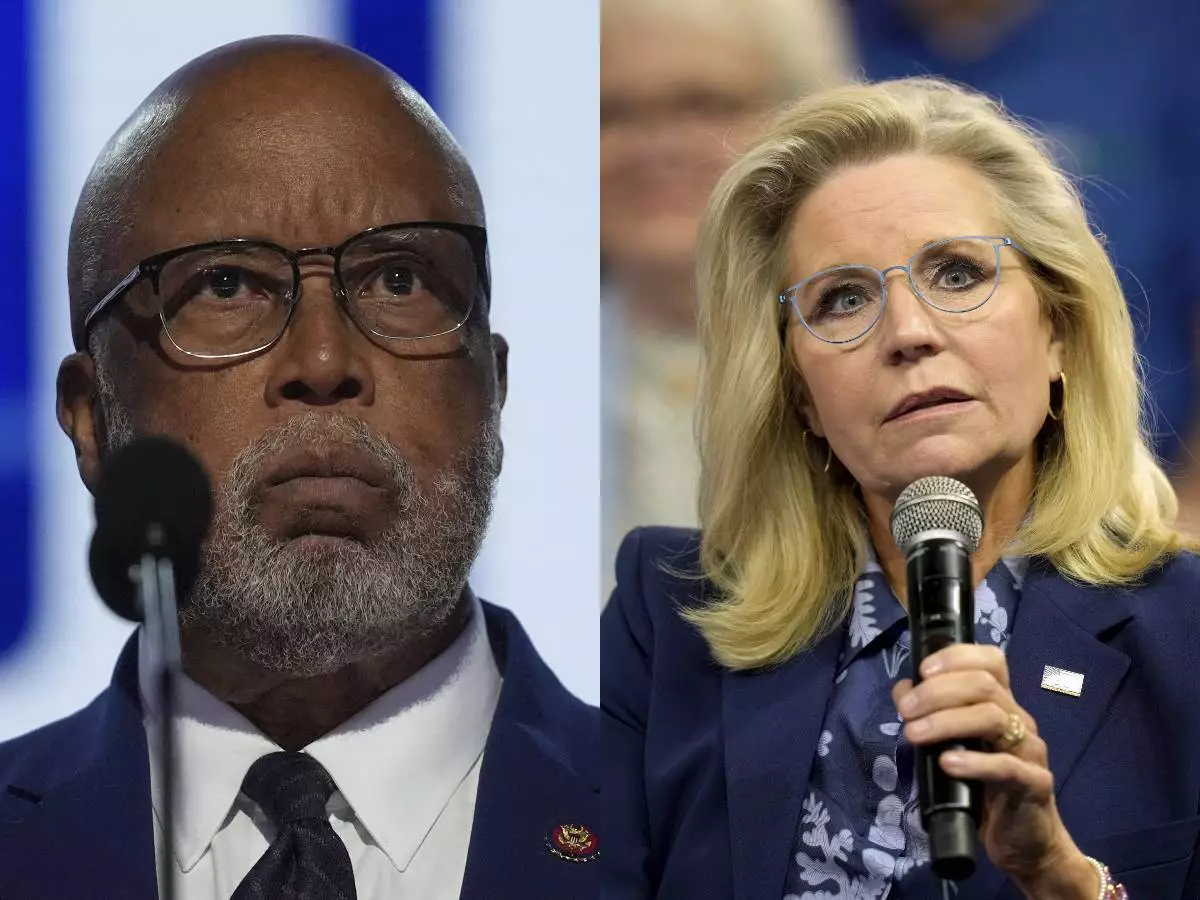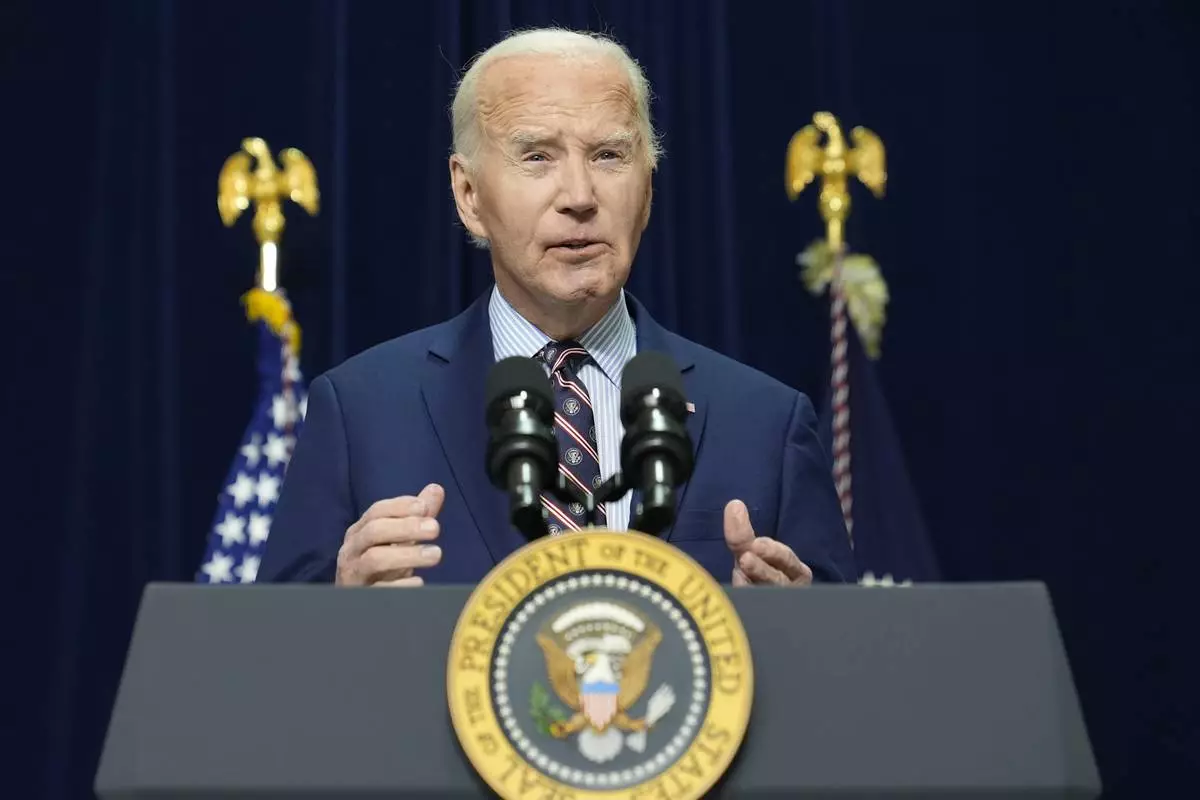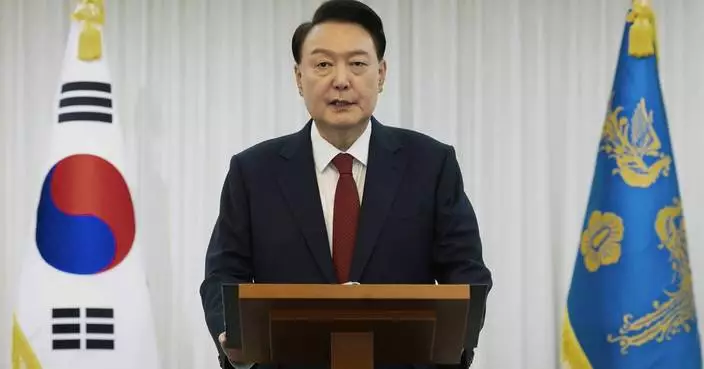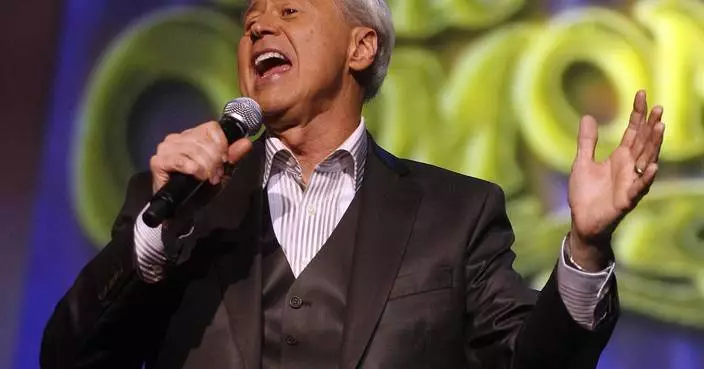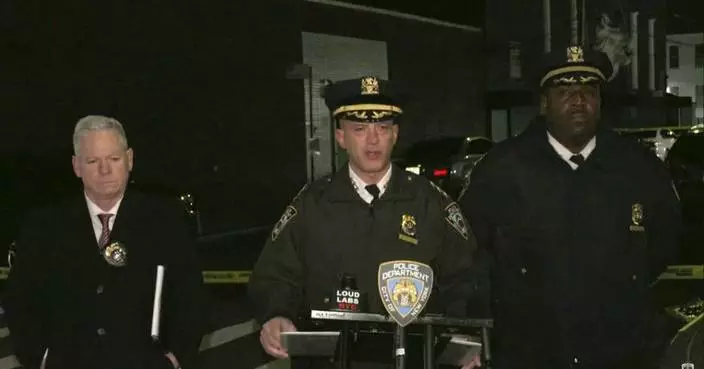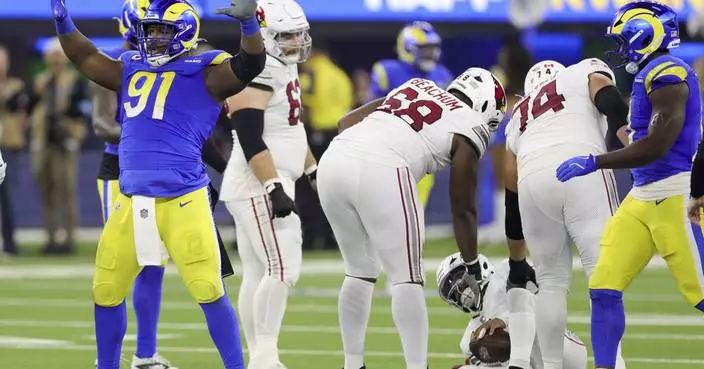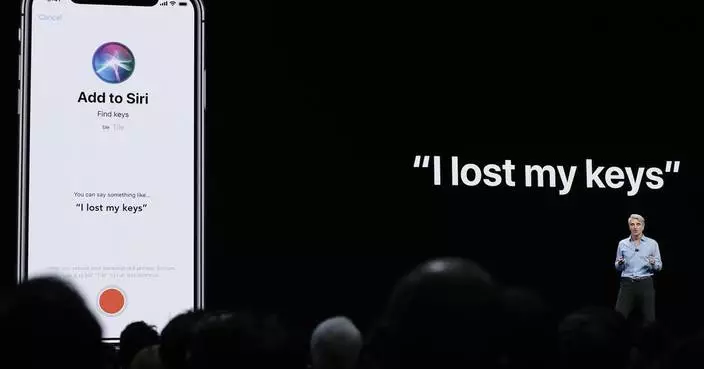EDITORS: As part of its coverage of the death of former President Jimmy Carter, The Associated Press is looking back at major events in his life. Carter's success at Camp David negotiating a Mideast Peace agreement between Egypt and Israel was one of his crowning achievements. AP Diplomatic Writer Barry Schweid covered Carter's announcement in this Sept. 17, 1978, story.
—-
President Carter announced to the world Sunday night that a “framework for peace” in the Middle East had been reached at his summit meeting with Egypt’s Anwar Sadat and Israel’s Menachem Begin.
Flanked by President Sadat and Prime Minister Begin, he said documents signed by the two leaders “will provide that Israel may live in peace within secure borders.”
The far-reaching accord commits Egypt and Israel to work to conclude a peace treaty within three months. The treaty would be the first formal recognition of the Jewish state by any of its Arab neighbors since the creation of Israel in 1948.
Begin, in a friendly challenge to Sadat, urged that the treaty be concluded before three months elapse. Sadat applauded the overture and nodded in agreement.
Carter said Israel would withdraw its forces from the West Bank of the Jordan River. The agreement allows the Israelis to maintain a security presence in specified bases while ending its military rule of the territory, taken in the Six-Day War of 1967.
Administration officials, who declined to be identified, said no American troops would be involved in the security arrangements negotiated at the summit, although they did not rule out American involvement sometime in the future.
The 1.1 million Palestinian Arabs living on the West Bank and in the Gaza Strip on the Sinai “will have the right to participate in the determination of their own future,” Carter said.
On the Sinai front, Carter said, Israel would withdraw its forces quickly, with the result being establishment of diplomatic relations between the two old foes in a 30-year conflict.
Carter’s appearance with Sadat and Begin at the White House was nationally televised. Flags of the United States, Israel and Egypt stood behind them.
The U.S. president, looking back on 13 days of “long negotiation,” acknowledged that at times the talks faltered and it seemed that the patience of Sadat and Begin would run out.
But Carter said results exceeded all expectations.
Sadat, speaking next at a ceremony in the White House East Room, thanked Carter for fulfilling his commitment to serving as a “full partner” in the talks.
Sadat expressed gratitude to Carter for his “spirit and dedication” and concluded with a prayer that the “spirit of Camp David” would mark a new chapter in Middle East history.
Begin, in a tribute to Carter, said “he worked harder than our forefathers did in building the pyramids of Egypt.”
The gentle reference to the Biblical period of Jewish slavery drew appreciative chuckles from the dignitaries on hand.
“The president of the United States won the day,” Begin said. “Peace now celebrates a great victory for the nations of Egypt and Israel and for all mankind.”
But before there is peace, Begin noted, Israel and Egypt have three months of negotiations ahead to conclude a peace treaty.
“Mr. President,” Begin said to Carter, “you inscribed your name forever in the history of two ancient people, the people of Egypt and the people of Israel.”
Turning to Sadat, the Israeli prime minister said there was no point in recounting the “saga” of their differences during the negotiations.
“Everything belongs to the past,” Begin said.
Now, once again, Begin said, he could refer to Sadat as “my friend.” Begin and saluted Sadat as a friend after the Egyptian leader’s historic visit to Jerusalem last November. But when the differences deepened after their talk at Ismailia, Egypt, in December, Begin no longer used the phrase.
When Begin concluded his remarks, he embraced Carter and then Sadat. The three leaders then signed the “framework for peace.”
Carter said the framework can be used later by Israel to negotiate peace treaties with her other Arab neighbors, Syria, Jordan and Lebanon.
After signing the documents, the three leaders shook hands.
Although differences remain, the prospect of peace between Egypt and Israel by Christmas was a stunning surprise, made even more dramatic by the deep secrecy imposed during the negotiations.
One question mark remaining was whether the concessions offered by Israel to the Palestinian Arabs living on the West Bank of the Jordan into the peace process.
Carter said he hoped “the foresight and wisdom” demonstrated by Sadat and Begin will guide all nations “as they continue to strive toward peace.”
The three leaders smiled and waved as they boarded a jet helicopter to depart Camp David for Washington. Carter climbed in first. Begin deferred to Sadat and urged the Egyptian leader to board second. The three men and the helicopter were lit by the glare of floodlights.
When the helicopter touched down on the White House south lawn, the three leaders were greeted by some 50 dignitaries and members of the White House staff. Each of the three got a kiss from the president’s wife, Rosalynn.
Senate Majority Leader Robert C. Byrd said Carter asked to explain the agreements to a joint session of Congress at 8 p.m. EDT on Monday.
The administration officials, who declined to be identified, said the documents “provide a framework for continuing negotiations” and not a completed agreement.
Forty issues remain unresolved after the 12-day summit, including the ultimate fate of Israeli settlements in the Sinai and the nature of the final arrangement for the West Bank and the Gaza Strip.
The agreement on the Sinai comes closer to being a final settlement, the officials said. It provides that Israel eventually restore Egyptian sovereignty “throughout the Sinai” and that Egypt will make peace and establish normal relations with Israel.
The Sinai agreement calls for phased withdrawal of Israeli troops, starting as soon as six months from Sunday night and the return of Sinai airfields to Egyptian civilian control.
It commits both Israel and Egypt to agreeing to a treaty within three months, with a major Israeli withdrawal three to nine months after the treaty is signed.
After the first Israeli withdrawal, the two countries agreed to establish normal diplomatic relations, the administration officials said.
The final Israeli withdrawal is to take place two to three years after the signing of the peace treaty. The treaty also is designed to provide security zones for Israel in the Sinai as well as a program of arms reduction in the area.
The major disagreement on the Sinai is the fate of Israeli settlements in captured territory. The officials said Egypt demands that Israel remove the settlements.
Israeli negotiators wanted the issue to be decided during the negotiations, the officials said. But they added that the Israel is agreed to let their parliament decide within two weeks on how the question should be resolved.
The agreement on the West Bank and Gaza Strip is much less specific, reflecting the difficulties in that area.
In that agreement, the officials said, Egypt and Israel agree to a five year transition period during which “the inhabitants will attain full autonomy,” but Israel will be able to station troops in specified bases in both the West Bank and Gaza areas.
The framework leaves unsettled the issues of the final borders between Israel and the new Palestinian entity and whether that entity will be a state, an affiliate of Jordan or something else.
The countries involved will invite Jordan to join their negotiations along with representatives of the Palestinians living in the two territories. Jordan also will be invited to play a “security role” during the period. Israel committed itself to establishing no new settlements in those territories during the negotiations, the officials said.
If and when a final agreement is reached, elected representatives of West Bank and Gaza inhabitants, predominately Palestinians, will have an opportunity to pass judgment on it, the officials said.
They said Israel and Egypt could agree only to exchanging letters on the emotional issue of the fate of Jerusalem. The officials would not disclose what was to be said in those letters.
The fact that Carter was meeting side-by-side with Sadat and Begin suggested that the summit had not ended in failure.
The White House appearance was arranged after Carter had mounted an all-out, 11th hour effort to narrow differences between Egypt and Israel on a peace formula.
As Carter drove for an agreement, facing a Sunday night deadline concurred in by all three leaders, officials of Egypt, Israel and the United States privately indicated he was making progress.
George Sherman, a State Department spokesman, disclosed the arrangement for the joint appearance after a day of negotiating at all levels in the summit delegations.
Declining to say whether the Camp David summit had concluded, Sherman declared he had been authorized to make only a “procedural announcement.”
In his final effort, Carter shuttled between Sadat and Begin and back again. But no three-way meeting was reported before the leaders appeared together for their wrapup announcement.
Carter went to Sadat’s quarters at Camp David for a 45-minute meeting Sunday morning. Then, the White House said, Carter spent six minutes - from 3:27 p.m. to 3:33 p.m. EDT - with Begin.
That session was followed by a second Carter-Sadat meeting. It lasted an hour and 50 minutes.
Israeli sources said, meanwhile, that Sadat also met with Israeli Defense Minister Ezer Weizman.
A White House announcement said “intensive consultations within and among the three delegations continued.”
No plans for a Carter-Begin-Sadat meeting were announced, however. They last met formally on Sept. 7.
In Washington, the president’s wife, Rosalynn, told a White House meeting of Hispanic leaders that Carter “says today Sunday is the last day. It might go to midnight. He just doesn’t know . . . He needs your prayers in these last hours of the summit meeting at Camp David.”
However, in Atlantic City, N.J., President Lloyd McBride of the United Steelworkers Union told a news conference that Carter had put off speaking to the union’s convention from Tuesday to Wednesday. A White House aide, Robert Neuman, said the delay is “due to the summit.”
At Camp David, a White House official confirmed that Carter had postponed his speech one day. The official, who asked that his name not be used, said Carter would be involved in post-summit details even if the summit was concluded by Tuesday.
Asked how Carter would report summit results to the nation, the official said the president had not yet decided. Congressional sources have said the White House has considered a presidential address to Congress or a nationally televised news conference.
Begin declined an invitation to speak, in person or by telephone, to a Sunday afternoon meeting of an Israel Bonds leadership conference in Washington.
A spokesman for the group, Gunther Lawrence, said Begin wanted to maintain a news blackout at the summit as long as the talks were in progress.
While there was no word on specifics, Israeli sources expressed “cautious optimism” after Carter and Begin ended a 45-hour session past midnight Saturday.
One source, who declined to be identified, said “a good atmosphere” characterized the session.
An Egyptian editor, Moussa Sabry of Al Akhbar, reported -- without offering any details -- that an earlier, 2 1/2-hour session between Carter and Sadat had produced a “dramatic development.”
Those upbeat outlooks contrasted with pessimism reflected by the Egyptian press when summit spokesman Jody Powell first announced the 12-day conference would end by Sunday night.
Powell said the leaders were likely to meet again in a three-way session — the first in 10 days -- before the end of the summit. Among items under discussion in the final hours was a wrapup communique. Powell indicated there might be more than one.
As the final countdown began, Carter attended Sunday services conducted at Camp David by Cecil Reed, a Protestant chaplain from nearby Ft. Ritchie, Md.
When Carter set up his separate meetings with Sadat and Begin, sources close to all three delegations reported the negotiations were at a delicate and critical stage.
At that point, Powell said, there was still no agreement on a “framework” for future negotiations between Egypt and Israel. That was Carter’s minimal goal when he invited Sadat and Begin to his secluded retreat in Maryland’s Catoctin Mountains.
Apart from procedural disputes, the two sides apparently had not settled any of the key issues. These center on whether Begin was willing to commit Israel to a withdrawal from the West Bank of the Jordan River and on how Israel’s security would be protected.
Sen. Henry M. Jackson, D-Wash., chairman of the arms control subcommittee, told the Israeli Bonds conference that efforts to include a West Bank settlement in an overall Middle East agreement was a mistake and doomed to failure.
“I am convinced that the Israelis are prepared to return the Sinai to Egypt in exchange for peace,” Jackson said.
Carter proposed the Sunday night deadline and Sadat and Begin concurred, according to Powell, spokesman for all three governments. He said the decision grew out a shared conclusion that the issue in dispute “had been certainly aired.”
Sadat and Begin have not had a face-to-face negotiating session since Sept. 7. Since then, Carter has shuttled between them. Sadat has met with Israeli Foreign Minister Moshe Dayan and Defense Minister Ezer Weizman.
American officials have tried to minimize the long time since the last formal meeting between Sadat and Begin. Still, there were persistent rumors of personal differences between the two leaders. Powell has not denied the rumors directly.
“I simply have not tried to keep a running tab on the personal feelings of these two men,” he said on Friday.

FILE - In this photo provided by the White House, the principals in the Middle East Summit, from left, Egyptian President Anwar Sadat, U.S. President Jimmy Carter, and Israeli Prime Minister Menachem Begin, meet for the first time at Camp David, Md., Sept, 6, 1978. (White House via AP, File)

FILE - President Jimmy Carter, center, is flanked by Israeli Prime Minister Menachem Begin and Egypt's President Anwar Sadat as they faced newsmen at the conclusion of their discussions toward Middle East Peace moves at Carter's Camp David retreat in Maryland in September 1978. (AP Photo, File)

FILE - President Jimmy Carter stands in front of the billowing flags of Egypt, on the left, and Israel as the national anthems of the three countries are played before the signing of the peace treaty at the White House in Washington, March 26, 1979. (AP Photo, File)

FILE - President Anwar Sadat of Egypt, U.S. President Jimmy Carter and Israeli Prime Minister Menachem Begin stand for the playing of their National Anthems at the White House in Washington, March 26, 1979, before the signing of the peace treaty between Israel and Egypt. (AP Photo, File)

FILE - President Jimmy Carter, Israeli Premier Menachem Begin and Egyptian President Anwar Sadat gather with their aides during discussions on Middle East problems at Camp David, Md., in September 1978. (AP Photo, File)

FILE - Egyptian President Anwar Sadat, left, U.S. President Jimmy Carter, center, and Israeli Prime Minister Menachem Begin clasp hands on the north lawn of the White House after signing the peace treaty between Egypt and Israel, March 26, 1979, in Washington. (AP Photo/ Bob Daugherty, File)









